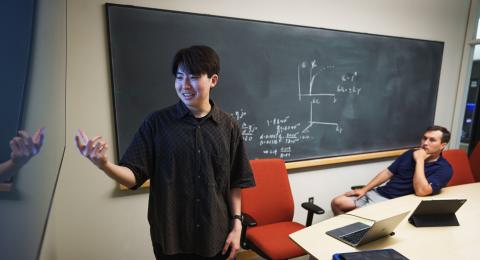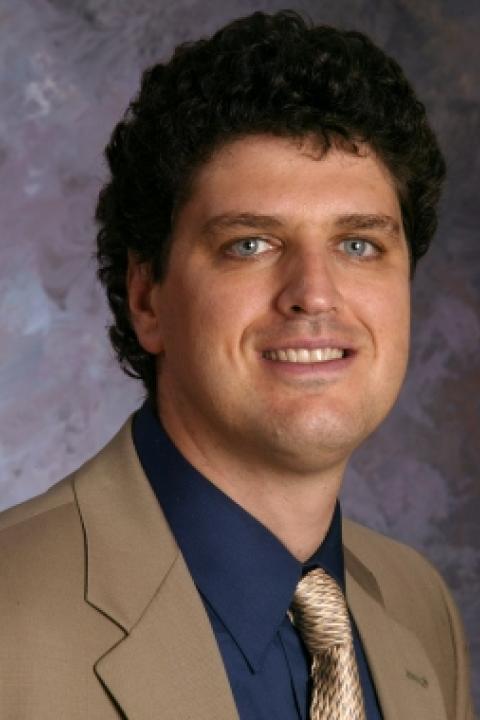The Physics Ph.D. program at UNH offers an in-depth exploration of core concepts like electromagnetic theory, quantum mechanics, and classical mechanics. At a top-tier research university with the Space Science Center, you'll engage in innovative research with award-winning faculty specializing in condensed matter, nuclear and particle physics, high energy theory, space physics, astrophysics and cosmology, and physics education. This rigorous training prepares you for successful careers in academia, industry, government research, or advanced postdoctoral studies.
Why pursue a Ph.D. in physics at UNH?
Expand your career opportunities within academia, industry or research through our physics Ph.D. program. You’ll work through a core curriculum exploring the fundamental areas of physics while also engaging with electives in your area of interest. You’ll apply advanced methodologies while conducting original research. If you are interested in teaching physics, you’ll also have the opportunity to pursue a cognate in college teaching. As a doctoral student in our program, you’ll have the opportunity to receive support through teaching assistantships, research assistantships or fellowships.
Program Highlights
The Department of Physics offers excellent research opportunities for graduate students. UNH physicists are engaged in world-class research in applied optics, condensed matter, nuclear and particle physics, education, and high energy theory and cosmology. The Space Science Center fosters research and education in all the space sciences, ranging from the ionosphere to the Earth's magnetosphere, the local solar system, and out to the farthest reaches of the universe. In addition, UNH has just reached the top tier of research universities, Carnegie Classification R1, and our research portfolio brings in more than $110 million in competitive external funding each year.
Potential career areas
- Academia
- Education
- Government research
- Patent law
- Private industry research/development
- Renewable energy
- Science communication
Curriculum & Requirements
The Physics Ph.D. program prepares students for a career in industry, education, research or academia. Students will progress from studying a core curriculum encompassing fundamental areas of physics to taking elective classes in their area of interest. They will then conduct original research in a particular research area, leading to their PhD dissertation and defense.
Degree Requirements
| Code | Title | Credits |
|---|---|---|
| PHYS 805 | Experimental Physics (or equivalent demonstrated experimental proficiency) | 4 |
| PHYS 931 | Mathematical Physics | 3 |
| PHYS 935 | Statistical Physics | 3 |
| PHYS 939 | Classical Mechanics | 3 |
| PHYS 941 & PHYS 942 | Electromagnetic Theory I and Electromagnetic Theory II | 6 |
| PHYS 943 & PHYS 944 | Quantum Mechanics I and Quantum Mechanics II | 6 |
| PHYS 806 | Introduction to Physics Research and Teaching (two semesters, taken during the first year in the program) | 1 |
| Select four additional 3+ credit elective courses, of which 2 may be at the 800 level 1 | 12 | |
| Total Credits | 38 | |
- 1
For Space Science students, these courses must include Plasma Physics (PHYS 951), Magnetohydrodyamics of the Heliosphere (PHYS 953), and one of Magnetospheres (PHYS 987), Heliospheric Physics (PHYS 954).
Students are required to
- demonstrate proficiency in teaching,
- pass the written comprehensive exam, and
- pass an oral qualifying exam on a thesis proposal.
Degree candidates are required to
- register for a minimum of two semesters of PHYS 999 Doctoral Research,
- pass the oral dissertation defense, and
- successfully submit the final dissertation to the Graduate School.
Program Learning Outcomes
- Students will master the theoretical concepts in advanced mechanics, electromagnetism, quantum mechanics and statistical mechanics at the graduate level.
- Students will have an advanced understanding of the mathematical methods, both analytical and computational, required to solve complex physics problems at the graduate level.
- Students will be proficient in experimental physics.
- Students will develop and demonstrate proficiency in teaching at the undergraduate level.
- Students will have a specialized knowledge of their chosen field of advanced research in physics.
- Students will be able to present advanced scientific ideas effectively in both written and oral form.
- Students will be well prepared for postgraduate study in physics and related disciplines, as well as advanced careers in a multitude of fields ranging from scientific and technical to financial.
Deadlines
Applications must be completed by the following deadlines in order to be reviewed for admission:
- Fall: Jan. 15 (for funding); after that on rolling basis until April 15
- Spring: N/A
- Summer: N/A
- Special: Spring admission by approval only
Application fee: $65
Campus: Durham
New England Regional: VT
Accelerated Masters Eligible: No
New Hampshire Residents
Students claiming in-state residency must also submit a Proof of Residence Form. This form is not required to complete your application, but you will need to submit it after you are offered admission, or you will not be able to register for classes.
Transcripts
If you attended UNH or Granite State College (GSC) after September 1, 1991, and have indicated so on your online application, we will retrieve your transcript internally; this includes UNH-Durham, UNH-Manchester, UNH Non-Degree work and GSC.
If you did not attend UNH, or attended prior to September 1, 1991, then you must upload a copy (PDF) of your transcript in the application form. International transcripts must be translated into English.
If admitted, you must then request an official transcript be sent directly to our office from the Registrar's Office of each college/university attended. We accept transcripts both electronically and in hard copy:
- Electronic Transcripts: Please have your institution send the transcript directly to grad.school@unh.edu. Please note that we can only accept copies sent directly from the institution.
- Paper Transcripts: Please send hard copies of transcripts to: UNH Graduate School, Thompson Hall- 105 Main Street, Durham, NH 03824. You may request transcripts be sent to us directly from the institution or you may send them yourself as long as they remain sealed in the original university envelope.
Transcripts from all previous post-secondary institutions must be submitted and applicants must disclose any previous academic or disciplinary sanctions that resulted in their temporary or permanent separation from a previous post-secondary institution. If it is found that previous academic or disciplinary separations were not disclosed, applicants may face denial and admitted students may face dismissal from their academic program.
Letters of recommendation: 3 required
Recommendation letters submitted by relatives or friends, as well as letters older than one year, will not be accepted.
GRE Optional
The GRE scores are optional, if you wish to provide scores please email the scores directly to the department once you have submitted your application online.
Personal Statement/Essay Questions
Prepare a brief but careful statement regarding:
- Reasons you wish to do graduate work in this field, including your immediate and long-range objectives.
- Your specific research or professional interest and experiences in this field.
Important Notes
All applicants are encouraged to contact programs directly to discuss program-specific application questions.
International Applicants
Prospective international students are required to submit TOEFL, IELTS, or equivalent examination scores. English Language Exams may be waived if English is your first language. If you wish to request a waiver, then please visit our Test Scores webpage for more information.























